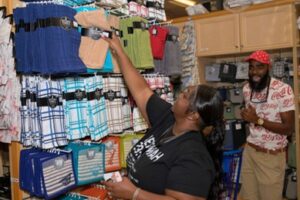By ERIC ROSE
Bahamas Information Services
NASSAU, The Bahamas – Minister of Education and Technical & Vocational Training the Hon. Glenys Hanna Martin said that apart from being an outlet for Bahamian cultural expression and growth, the Creative and Performing Arts School (CAPAS), set to open in September 2025, had incredible potential for the economic reality of individuals and the entire nation.
“This is a most liberating moment, I believe, for our people, for our country,” she said at a press conference announcing the latest updates for CAPAS, held at the Island House Cinema, on March 24, 2025.
“It was something that had been promised,” she added. “We did a launch (of the official consultation) January last year, and some didn’t believe it would happen; but here we are.”
Also speaking at the event were Minister of Labour and the Public Service the Hon. Pia Glover-Rolle; CAPAS Project leader Ian Poitier, who gave in-depth information on CAPAS; and via video, Sam Glynne of United Talent Agency (UTA).
Mr. Poitier announced UTA as a major new international partnership, and a leading global talent, entertainment, and sports company.
According to a release, that collaboration was poised to “significantly enhance CAPAS’s film, television, and performing arts programmes, positioning The Bahamas as a rising hub for creative production in the region”.
Also, spearheaded by The Government of The Bahamas, CAPAS will be the first institution in The Caribbean to provide comprehensive training in the creative, performing and production arts, especially for television, film and the stage, to include commercial and music video production.
“We are so excited to work with UTA, one of the world’s most influential entertainment companies, to elevate our creative and performing arts programmes,” Mr. Poitier said in the release. “UTA’s experience and expertise will help to unlock the enormous creative and cultural potential of The Bahamas and the region.”
As part of its commitment to the long-term success of the program, UTA will support the establishment of an Advisory Board which will include industry veterans, ensuring that CAPAS’s curriculum remains up-to-date with the latest trends and technologies in the entertainment sector, the release stated. Additionally, UTA will help promote The Bahamas as a home for international productions, and launch initiatives to increase CAPAS’s visibility on the international stage.
CAPAS students will also benefit from unique opportunities, such as visiting UTA’s offices in Beverly Hills and gaining exposure to high-profile productions across the U.S. and Europe. UTA will further help to secure internships and placements, bridging the gap between academic learning and real-world experience in the entertainment industry, according to the release.
Mr. Poitier also announced that CAPAS will operate out of the former Phil’s Food Service building on Gladstone Road, and the site will feature studio performing and practicing spaces. He added that that institute was slated to open with an initial enrolment of 20 performing arts students and 40 production students. Auditions will open in May for the autumn term, for students at least 18 years old.
Minister of Education Glenys Hanna-Martin pointed out that CAPAS would also help to address the low number of teachers in the public school sector who focus on the creative arts.
“We found that there was no emphasis on the creative arts,” Minister Hanna Martin said. “All of the research is showing how important the creative arts is for young people as they develop.”
She added: “We have become very focused on the academics, which is okay, but we are more than that. And, so, we entered into an agreement with the Shirley Hall Bass Foundation, which is now training teachers so that we can begin offerings in dance, in drama, etc., and to do it in a skilled way. So, teachers are being trained in this regard. We would want to work with CAPAS to develop the skillset of teachers even more.”
“We envision that the creative arts is important – [as is generally known] – but for those students who are particularly interested in this as a career, they would feed into CAPAS as a tertiary institution,” Minister Hanna Martin said.
Minister Glover-Rolle noted that there were a number of Cabinet Ministers and Parliamentarians, including herself and Minister Hanna Martin who had personal experiences with being in the creative arts and the Orange Economy, who are now helping to put passion behind ensuring that CAPAS comes to fruition.
“This institute will also bring a positive impact to what we call the social fibre of our country,” she stated. “Yes, the economic boost, and yes the opportunity for sustainable careers – not ‘jobs’.”
“While this is arts-based, it speaks to almost every demographic of our society,” she added.
Minister Glover-Rolle pointed out that, as a Labour Department, they were also tasked with addressing the gaps in The Bahamas’ labour market regarding the ‘productions’ line of work, for those who may want to pursue that avenue.
“So the Orange Economy, as promised by our administration, is getting focus and I think that this is dynamic focus; and, of course, The Bahamas is leading the way because this will not only be the premier institute for the creative arts in The Bahamas, but around the region as we intend to attract students from The Bahamas and the Caribbean,” she added.
PHOTO CAPTION
Minister of Education and Technical & Vocational Training the Hon. Glenys Hanna Martin (centre) and Minister of Labour and the Public Service the Hon. Pia Glover-Rolle joined Project Lead for the Creative and Performing Arts School (CAPAS), Ian Poitier in announcing updates and a new partnership with United Talent Agency (UTA), at a press conference held at the Island House Cinema, on March 24, 2025. Also speaking at the event via video was Sam Glynne of UTA. (BIS Photos/Eric Rose)

















